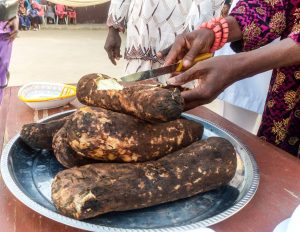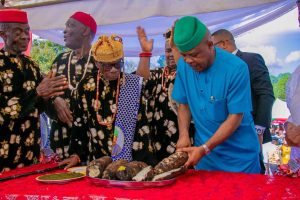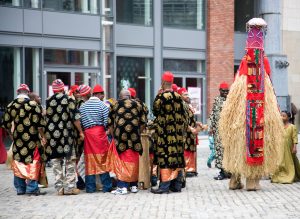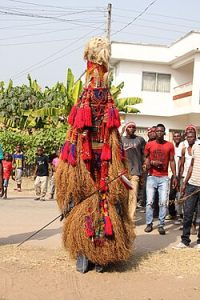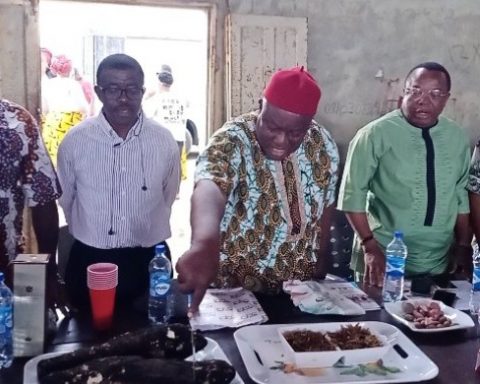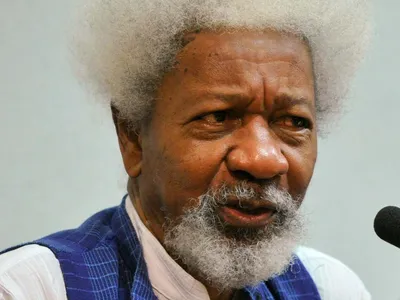As the August sun dips behind the rolling hills of southeastern Nigeria, the air thickens with the smell of roasting yams and the steady beat of drums.
In village squares from Anambra to Enugu, families gather in anticipation of a ritual older than memory itself.
Join our WhatsApp ChannelIt is the season of Iri Ji the New Yam Festival – when the Igbo people pause to give thanks for the harvest, celebrate community, and renew their bond with the earth.
Generations ago, a man’s wealth was measured by the size of his yam barn. Even today, the tuber remains a symbol of prosperity, strength, and life’s enduring cycle. No one dares taste the year’s fresh harvest until the gods and ancestors have been properly honored. The festival begins with libations of palm wine, kola nut offerings, and prayers to Ala, the earth goddess, and to Chukwu, the supreme creator.
Only after the eldest man or traditional ruler breaks the first yam often dipping it into rich red palm oil can the community partake of the new crop.
The King of Crops
For the Igbo, yam is not just food. It is king. In Igbo cosmology, the yam is life itself. The crop, introduced thousands of years ago and perfected through generations of careful farming, is considered the king of food, a measure of prosperity, and a metaphor for resilience.
“Yam is to the Igbo what wheat is to Europe or rice to Asia,” explains cultural historian Chinyere Okeke. “It sustains the body and defines social status. Traditionally, a man’s wealth was measured by the size of his yam barn.”
Because of this deep symbolism, no Igbo person eats the season’s new yam until the gods and ancestors have been thanked. The festival’s name itself – Iri Ji, literally “to eat yam”- speaks to this reverence.
A Ritual of Gratitude
Preparations begin days before the public celebration. Elders consult diviners and select a date between late August and early October, when the harvest is ready. On the morning of the festival, the community gathers at the village square or the palace of the Eze (king) or Igwe (chief). Offerings of yam, kola nuts, and palm wine are presented to Chukwu, the supreme God, and to Ala, the earth goddess who ensures fertility.
The most solemn moment comes when the king or eldest man cuts and tastes the first yam, often dipping it in bright red palm oil. Only after this ritual known as the breaking of the yam can anyone eat from the new harvest. It is both a prayer of gratitude and an act of spiritual permission, a way of acknowledging that the land, not man, gives the ultimate blessing.
Drums, Masks, and Dances
From this sacred act flows a day of spectacle. Once the first yam is eaten, the village explodes into celebration. Masquerades, or mmanwu, emerge from the sacred groves, their wooden masks and raffia costumes blending art, mystery, and spirituality. Some glide gracefully; others leap and twirl, embodying ancestral spirits believed to protect the community.
The air rings with the clanging of ogene gongs and the deep thump of the ekwe drum. Youths display agility in wrestling matches, a test of strength and bravery. Women swirl in coral beads and brightly patterned wrappers, their steps keeping time with the intoxicating rhythms of the Atilogwu dance. Children dart between pots of yam pepper soup and plates of roasted tubers, eager for the first taste.
The feast is endless: pounded yam with ofe nsala (white soup), yam porridge with palm oil, and Roasted yam with spicy sauce each dish celebrating the harvest’s bounty.
READ ALSO : Abuja To Host 16-Day ‘Groovy December’ Festival To Boost Tourism
Olojo: The ‘Day of Creation’ and the Sacred Crown of Ile-Ife
A Festival of Peace and Renewal
Yet the Iri Ji is more than entertainment. It is a yearly reminder of gratitude and unity. In many communities, quarrels are settled before the festival so that the new agricultural cycle can begin free of bitterness. “You cannot start a new season with old grudges,” says Chief Ikechukwu Nwosu of Enugu. “The yam will not grow if the heart is bitter.”
This ethos of reconciliation reflects a wider Igbo belief in cyclical renewal. Just as the earth rests and regenerates, so too must human relationships be refreshed.
Old Traditions, New Homes
Though Christianity and urban migration have reshaped Igbo life, the festival endures. In Lagos, Abuja, and even in diaspora hubs like London and Houston, Igbo unions now host their own New Yam celebrations. Modern touches, live bands, fashion shows, and social media live-streams. blend with the timeless ritual of breaking the first yam.
These global gatherings are more than nostalgia; they are acts of preservation. As younger generations grow up far from ancestral homelands, the festival serves as a vibrant classroom for Igbo language, values, and identity. “It’s how we teach our children who they are,” says Ifeoma Eze, an organizer of the London Igbo Union’s annual New Yam event. “Through the yam, they learn gratitude, respect for elders, and the beauty of our culture.”
An Invitation to the World
The Igbo people, estimated at over 40 million worldwide, carry this tradition wherever they go. Diaspora communities from Europe to North America and Asia organize annual New Yam Festivals, teaching their children the meaning behind the rituals: the yam as a symbol of resilience, the breaking of grudges as a path to peace, and the honoring of ancestors as an affirmation of continuity.
For travelers and culture lovers, the New Yam Festival offers a window into Africa’s deep agricultural traditions and the philosophy of abundance. It is not simply about eating, it is about honoring the earth, the ancestors, and the communal spirit that binds people together.
As night falls and the final drumbeat fades into the warm Nigerian air, the message lingers: seasons turn, harvests come and go, but gratitude endures. In the glow of lanterns and the taste of sweet, freshly harvested yam, the Igbo remind the world of a timeless truth that the earth gives, and humanity must give thanks.
In an age of fast food and fleeting trends, the Iri Ji festival remains a powerful reminder of the bond between humans and the soil.
It celebrates not only the yam but the endurance of a people who, despite colonization, migration, and modernization, still gather each year to give thanks before tasting the fruits of their labor. For the Igbo, the lesson is eternal. For the world, it is timely: to eat is to depend on the earth, and to thrive is to remember where abundance begins.
The Iri Ji festival is more than a Nigerian cultural treasure. Like Thanksgiving in the United States, the Mid-Autumn Festival in China, or India’s Pongal, it speaks to a universal need: to pause, give thanks, and honor the land that sustains life. Across continents, the breaking of the yam echoes a shared human rhythm – celebrating the harvest is, ultimately, celebrating survival itself.
Amanze Chinonye is a Staff Correspondent at Prime Business Africa, a rising star in the literary world, weaving captivating stories that transport readers to the vibrant landscapes of Nigeria and the rest of Africa. With a unique voice that blends with the newspaper's tradition and style, Chinonye's writing is a masterful exploration of the human condition, delving into themes of identity, culture, and social justice. Through her words, Chinonye paints vivid portraits of everyday African life, from the bustling markets of Nigeria's Lagos to the quiet villages of South Africa's countryside . With a keen eye for detail and a deep understanding of the complexities of Nigerian society, Chinonye's writing is both a testament to the country's rich cultural heritage and a powerful call to action for a brighter future. As a writer, Chinonye is a true storyteller, using her dexterity to educate, inspire, and uplift readers around the world.





